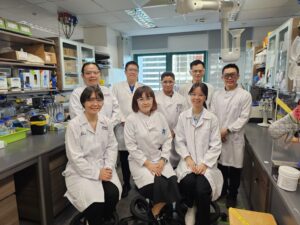
Authors of the study, from NUS Medicine: (Back row, from left) Assoc Prof Justin Chu, Dr. Kai Sen Tan, Migara Jayasinghe (Pharmacology), Dr. Dai Cao Phung (Pharmacology), Brendon Zhi Jie Yeo (Pharmacology); (Front row, from left) Asst Prof Minh Le (Pharmacology), Gao Chang (Pharmacology), Rebecca Carissa Prajogo (Pharmacology).
The COVID-19 pandemic demonstrated the importance of being prepared with drug interventions to contain viral outbreaks that can otherwise have devastating consequences. In preparing for the next pandemic—or Disease X, there is an urgent need for versatile platform technologies that could be repurposed upon short notice, to combat infectious outbreaks.
A team of researchers, led by Assistant Professor Minh Le from the Institute for Digital Medicine (WisDM) and Department of Pharmacology at the Yong Loo Lin School of Medicine, National University of Singapore (NUS Medicine), discovered that nano-sized particles released by cells, termed “extracellular vesicles” (EVs), can curb the viral infectivity of SARS-CoV-2—its wild type and variant strains—and potentially other infectious diseases. Asst Prof Le said, “Our study showed that these cell-derived nanoparticles are effective carriers of drugs that target viral genes precisely. These EVs are therefore an efficient tool for therapeutic intervention in patients who are infected with COVID-19 or other infectious diseases.”
The study, conducted in collaboration with NUS Medicine’s Biosafety Level 3 (BSL3) Core Facility, the Cancer Science Institute of Singapore, and the School of Physical and Mathematical Sciences at Nanyang Technological University (NTU), demonstrated potent inhibition of COVID-19 infection in laboratory models using a combination of EV-based inhibition and anti-sense RNA therapy mediated by antisense oligonucleotides (ASOs).
